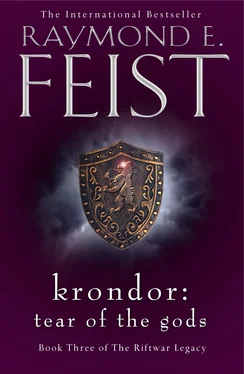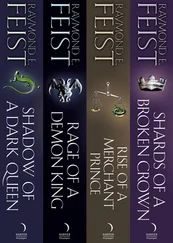THE WEATHER WORSENED.
Dark clouds roiled overhead as angry lightning flashed, piercing the night’s blackness on all quarters. The lookout atop the highest mast of the ship Ishap’s Dawn thought he saw a flicker of movement in the distance and squinted against the murk. He tried to use his hand to shield his eyes as the salt spray and biting cold wind filled them with tears. He blinked them away and whatever movement he thought he had seen was gone.
Night and the threat of storms had forced the lookout to spend a miserable watch aloft, against the unlikely chance the captain had drifted off course. It was hardly possible, considered the lookout, as the captain was a knowledgeable seaman, chosen for his skill at avoiding danger as much as any other quality. And he knew as well as any man how hazardous this passage was. The Temple held the cargo’s value second to none, and rumours of possible raiders along the Quegan coast had dictated a hazardous tack near Widow’s Point, a rocky area best avoided if possible. But Ishap’s Dawn was crewed by experienced sailors, who were now closely attentive to the captain’s orders, and each was quick to respond, for every man aloft knew that, once upon the rocks at Widow’s Point, no ship survived. Each man feared for his own life – that was only natural – but these men were chosen not only for their seamanship, but also for fealty to the Temple. And they all knew how precious their cargo was to the Temple.
In the hold below, eight monks of the Temple of Ishap in Krondor stood around a most holy artifact, the Tear of the Gods. A jewel of astonishing size, easily as long as a large man’s arm and twice as thick, it was illuminated from within by a mystic light. Once every ten years a new Tear was formed in a hidden monastery in a tiny secret valley in the Grey Tower Mountains. When it was ready and most holy rites completed, a heavily armed caravan transported it to the nearest port in the Free Cities of Natal. There it was placed upon a ship and carried to Krondor. From there, the Tear and an escort of warrior monks, priests, and servants would continue on, eventually reaching Salador to then be taken by ship and transported to the mother Temple in Rillanon where it replaced the previous Tear, as its power waned.
The true nature and purpose of the sacred gem was known only to the highest ranking among those serving within the Temple, and the sailor high atop the main mast asked no questions. He trusted in the power of the gods and knew that he served a greater good. And he was being handsomely paid not to ask questions as much as to stand his watch.
But after two weeks of battling contrary winds and difficult seas, even the most pious man found the blue-white light which shone every night from below, and the monks’ incessant chanting, nerve-wracking. The duration of the unseasonable winds and unexpected storms had some of the crew muttering about sorcery and dark magic. The lookout offered a silent prayer of thanks to Killian, Goddess of Nature and Sailors (and then added a short one to Eortis, who some said was the true God of the Sea) that come dawn they would reach their destination: Krondor. The Tear and its escort would quickly leave the city for the east, but the sailor would remain in Krondor, with his family. What he was being paid would allow him a long visit home.
The sailor above thought of his wife and two children, and he smiled briefly. His daughter was now old enough to help her mother around the kitchen and with her baby brother, and a third child was due soon. As he had a hundred times before, the sailor vowed he’d find other work near home, so he could spend more time with his family.
He was pulled from his reverie by another flicker of movement towards shore. Light from the ship painted the storm-tossed combers and he could sense the rhythm of the sea. Something had just broken the rhythm. He peered through the murk, trying to pierce the gloom by strength of will, to see if they might be drifting too close to the rocks.
Knute said, ‘The blue light coming from that ship gives me a bad feeling, Captain.’
The man Knute addressed towered over him as he looked down. At six foot eight inches tall he dwarfed those around him. His massive shoulders and arms lay exposed by the black leather cuirass he favoured, though he had added a pair of shoulder pads studded with steel spikes – a prize taken off the corpse of one of Queg’s more renowned gladiators. The exposed skin displayed dozens of reminders of battles fought, traces of old wounds intersecting one another. A scar that ran from forehead to jawbone through his right eye, which was milky white, marked his face. But his left seemed to glow with an evil red light from within and Knute knew that eye missed little.
Save for the spikes on his shoulders, his armour was plain and serviceable, well oiled and cared for, but displaying patches and repairs. An amulet hung around his neck, bronze but darkened by more than time and neglect, stained by ancient and black arts. The red gem set in its middle pulsed with a faint inner light of its own as Bear said, ‘Worry about keeping us off the rocks, pilot. It’s the only reason I keep you alive.’ Turning to the rear of the ship, he spoke softly, but his voice carried to the stern. ‘Now!’
A sailor at the rear spoke down to those in the hold below, ‘Forward!’ and the hortator raised one hand, and then brought its heel down on the drum between his knees.
At the sound of the first beat, the slaves chained to their seats raised their oars and on the second beat they lowered them and pulled as one. The word had been passed, but the Master of Slaves who walked between the banks of oars repeated it. ‘Silently, my darlings! I’ll kill the first of you who makes a sound above a whisper!’
The ship, a Quegan patrol galley seized in a raid the year before, inched forward, picking up speed. At the prow, Knute crouched, intently scanning the water before him. He had positioned the ship so it would come straight at the target, but there was one turn that still needed to be made to port – not difficult if one reckoned the timing correctly, but dangerous nevertheless. Suddenly Knute turned and said, ‘Now, hard to port!’
Bear turned and relayed the order and the helmsman turned the ship. A moment later Knute ordered the rudder amidships, and the galley began to cut through the water.
Knute’s gaze lingered on Bear for a moment, and then he returned his attention to the ship they were about to take. Knute had never been so frightened in his life. He was a born pirate, a dock-rat from Port Natal who had worked his way up from being an ordinary seaman to being one of the best pilots in the Bitter Sea. He knew every rock, shoal, reef, and tide pool between Ylith and Krondor, and westward to the Straits of Darkness, and along the coast of the Free Cities. And it was that knowledge that had kept him alive more than forty years while braver, stronger, and more intelligent men had died.
Knute felt Bear standing behind him. He had worked for the enormous pirate before, once taking Quegan prize ships as they returned from raids along the Keshian coast. Another time he had served with Bear as a privateer, under marque from the Governor of Durbin, plundering Kingdom ships.
For the last four years Knute had run his own gang, scavengers picking over wrecks drawn upon the rocks by false lights here at Widow’s Point. It had been the knowledge of the rocks and how to negotiate them that had brought him back into Bear’s service. The odd trader named Sidi, who came to the Widow’s Point area every year or so, had asked him to find a ruthless man, one who would not shirk from a dangerous mission and who had no aversion to killing. Knute had spent a year tracking down Bear and had sent him word that there was a job of great risk and greater reward waiting. Bear had answered and had come to meet with Sidi. Knute had figured he’d either take a fee for putting the two men in touch, or he might work a split with Bear in exchange for use of his men and his ship. But from that point where Knute had brought Bear to meet with Sidi, on the beach at Widow’s Point, everything had changed. Instead of working for himself, Knute was now again working as Bear’s galley-pilot and first mate – Knute’s own ship, a nimble little coaster, had been sunk to drive home Bear’s terms: riches to Knute and his men if they joined him. If they refused, the alternative was simple: death.
Читать дальше












